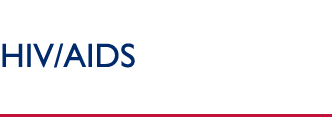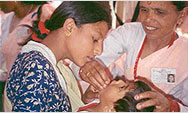USAID's Office of HIV/AIDS
The Office of HIV/AIDS at the U.S. Agency for International Development (USAID) is the focus of HIV/AIDS technical leadership for the Agency and has primary responsibility for leading the Agency's efforts within President George W. Bush's Emergency Plan for AIDS Relief (PEPFAR). The Emergency Plan — a $15 billion multifaceted approach to combating the disease in more than 120 countries around the world — is the largest commitment ever by any nation for an international health initiative dedicated to a single disease. In cooperation with the U.S. Department of State's Office of the U.S. Global AIDS Coordinator, other U.S. Government partners, international organizations, and nongovernmental organizations, USAID provides global technical leadership on the full range of issues related to HIV/AIDS prevention, care, and treatment; manages numerous research and field support programs; and monitors the impact of the Agency's HIV/AIDS programs.
Partnering for Success: USAID Support of the Emergency Plan
USAID support of Emergency Plan HIV/AIDS programs extends to nearly 100 countries through a combination of direct in-country presence and a variety of regional programs. As an international development agency, USAID has focused for many years on strengthening primary health care systems to prevent and more recently treat a number of communicable diseases, including HIV/AIDS. Under the Emergency Plan, USAID's staff of foreign service officers, trained physicians, epidemiologists, and public health advisors works with governments, nongovernmental organizations, and the private sector to provide training, technical assistance, and supplies – including pharmaceuticals – to prevent and reduce the transmission of HIV/AIDS and provide care and treatment to people living with HIV/AIDS. As the HIV/AIDS epidemic in most countries outside of the Emergency Plan's 15 focus countries is still limited to high-risk groups, USAID focuses considerable resources on reducing high-risk behaviors in high-risk groups and the general population.
USAID is uniquely positioned to support multisectoral responses to HIV/AIDS that address the widespread impact of HIV/AIDS outside the health sector in high-prevalence countries. In these countries, USAID is supporting programs in areas such as agriculture, education, democracy, and trade that link to HIV/AIDS and mutually support the objective of reducing the impact of the pandemic on nations, communities, families, and individuals.
Under the Emergency Plan, USAID also supports a number of international partnerships; provides staff support to the Global Fund to Fight AIDS, Tuberculosis and Malaria; and works with local coordinating committees of the Global Fund to improve implementation of the Fund programs and their complement to U.S. Government programs. Finally, USAID supports targeted research, development, and dissemination of new technologies, and packaging and distribution mechanisms for antiretroviral drugs. |


